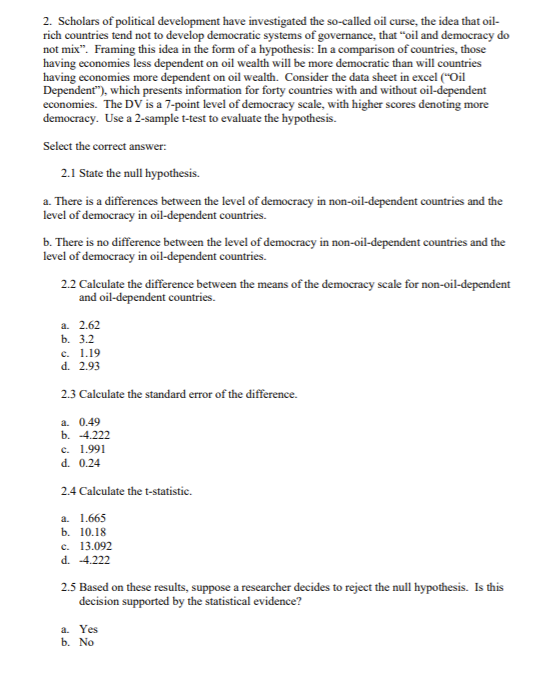Question
Scholars of political development have investigated the so-called oil curse, the idea that oil rich countries tend not to develop democratic systems of governance, that

Scholars of political development have investigated the so-called oil curse, the idea that oil rich countries tend not to develop democratic systems of governance, that "oil and democracy do not mix". Framing this idea in the form of a hypothesis: In a comparison of countries, those having economies less dependent on oil wealth will be more democratic than will countries having economies more dependent on oil wealth. Consider the data sheet in excel ("Oil Dependent"), which presents information for forty countries with and without oil-dependent economies. The DV is a 7-point level of democracy scale, with higher scores denoting more democracy. Use a 2-sample t-test to evaluate the hypothesis.
Select the correct answer:
2.1 State the null hypothesis. a. There is a differences between the level of democracy in non-oil-dependent countries and the level of democracy in oil-dependent countries. b. There is no difference between the level of democracy in non-oil-dependent countries and the level of democracy in oil-dependent countries.
2.2 Calculate the difference between the means of the democracy scale for non-oil-dependent and oil-dependent countries.
a. 2.62 b. 3.2 c. 1.19 d. 2.93 2.3
Calculate the standard error of the difference.
a. 0.49 b. -4.222 c. 1.991 d. 0.24 2.4 Calculate the t-statistic. a. 1.665 b. 10.18 c. 13.092 d. -4.222
2.5 Based on these results, suppose a researcher decides to reject the null hypothesis. Is this decision supported by the statistical evidence? a. Yes b. No


Step by Step Solution
There are 3 Steps involved in it
Step: 1

Get Instant Access to Expert-Tailored Solutions
See step-by-step solutions with expert insights and AI powered tools for academic success
Step: 2

Step: 3

Ace Your Homework with AI
Get the answers you need in no time with our AI-driven, step-by-step assistance
Get Started


